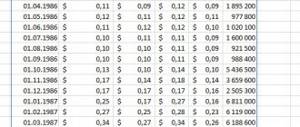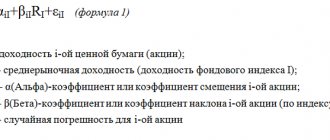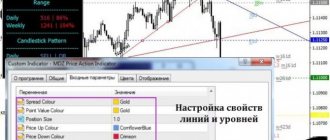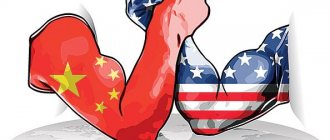Lazy Investor Blog > News
2018 was marked by the beginning of the so-called trade war between the United States and China. This became one of the most discussed events among investors. At the beginning of May 2021, the confrontation reached a new stage of development, in which the American president increased pressure on Beijing. Plans were announced to increase import tariffs and duties on Chinese goods from 10 to 25%. The Celestial Empire is taking retaliatory steps and announcing the cancellation of the next negotiations. Where did the “fashion” for trade wars come from and what is their role in the global economy?
First Opium War: 1839-1842
Cause of conflict:
The prerequisites for the war were the imbalance of the trade balance between these countries in favor of China, the cause of which was the Chinese policy of protecting the empire from foreign influence.
A product that was in demand in China and could equalize the trade balance, bringing huge profits to the British, was opium, but its sale was prohibited by imperial decrees.
Opium smuggling continued for several decades until the 1830s. China did not put an end to it with harsh measures.
Pursuing a policy to protect the Chinese market from drugs, in December 1839 the emperor closed the country's market to all merchants and smugglers from England and India, which led to Britain declaring war on the Qing Empire in April 1840.
The President of the United States of America spoke out in support of the war.
Results:
On August 29, 1842, after decisive victories and access to Nanjing, Great Britain imposed the “Treaty of Nanjing” on the Qing Empire, which was beneficial for itself.
According to the agreement, the Qing Empire paid Great Britain a large indemnity, transferred the island of Hong Kong and opened Chinese ports to English trade.
The English crown received a gigantic source of income from the sale of opium.
The Qing Empire began a long period of weakening of the state and civil unrest, which led to the enslavement of the country by European powers and the gigantic spread of drug addiction, degradation and mass extinction of the population.
Second Opium War: 1857-1860
Cause of conflict:
Dissatisfied with the results of the Treaty of Nanjing, England tried to open the way to the inner provinces of China and seize its river ports.
In 1854, Great Britain, France and the USA tried to revise the treaties of 1841-1842, demanding the right to unlimited trade throughout China and official permission to trade in opium, but political intrigues did not lead to the desired result.
Results:
On October 24-25, 1860, the Beijing Treaties were signed, according to which the Qing Empire paid large indemnities, opened Tianjin to foreign trade, and allowed the use of Chinese as slave labor in the colonies of Great Britain and France.
From that moment on, the southern part of the Kowloon Peninsula passed to Great Britain, and Russia received the Ussuri region.
Moreover, the latter did not formally belong to China, being a hereditary reserve of the Manchu dynasty, which had the right to dispose of it at its own discretion and limited the Chinese settlement of this territory over the previous two centuries.
Smoot-Hawley Tariff Act
The Smoot-Hawley Tariff Act was an American tariff law signed by the President on June 17, 1930.
The law raised duty rates on more than 20 thousand imported goods. 1,028 prominent American economists opposed the law, but President Herbert Hoover signed it. The result was a response from other countries that raised tariffs on American goods, which led to a sharp drop in trade between the United States and European countries and finally pushed the economy into the Great Depression.
Thus, Canada already in May 1930 introduced new increased tariffs on 16 goods, the share of which in American exports to Canada was 30%. And later Canada strengthened cooperation within the British Commonwealth.
France and Great Britain protested and began to develop trade with other countries. Germany, on the contrary, increased its isolation from the Western world, while simultaneously expanding trade relations with the Soviet Union.
According to official statistics, total US imports fell 66% from $4.4 billion in 1929 to $1.5 billion in 1933, and US exports fell 61% from $5.4 billion to $2.1 billion. , which hit the country’s GDP hard.
Imports from Europe fell from $1.334 billion in 1929 to $390 million in 1932, while American exports to Europe fell from $2.34 billion to $784 million.
What are trade and economic wars
The term “trade war” can be defined as a confrontation between two or more states, in which one side is trying to protect its economy, while the other is trying to destroy it in order to capture markets or the state itself.
History of trade wars
The first full-fledged trade war in world history can be called events that took place in Ancient Greece, dating back to 432-430 BC.
Athens, which at that time stood at the head of the Delian League and carried out a full-fledged economic expansion into the policies included in the Peloponnesian League, at the helm of which was Sparta, introduced an embargo on trade relations with Megara. The crisis that arose after these sanctions provoked a real war, which went down in history as the Peloponnesian War.
Its outcome was the capitulation of Athens and its entry into the Peloponnesian League. After this, trade wars became an integral part of the world economy and all major states got involved in them in one way or another.
The impact of trade wars on the global economy
Economic confrontations between large countries that are world leaders seriously affect the global economy. The introduction of sanctions, the cessation of supplies of strategically important resources and other methods of waging trade wars force opponents to change relations with third countries, look for new partners or reconsider relations with old ones.
As a result, the situation on the global market is changing. This is not to say that the world economy could collapse because of this - wars have long become the norm. There is only a temporary shift in the balance in favor of certain economic unions, blocs of partner countries and individual states.
Chicken Wars
Between 1961 and 1964 there was tension over the issue of tariffs, which took place at the height of Cold War politics known as the "Chicken War".
Thanks largely to post-World War II intensive poultry farming and accompanying price declines, chicken has become associated with luxury internationally, but in the United States it is becoming a staple food.
Until the early 1960s, chicken and other foods remained prohibitively expensive in Europe, remaining a delicacy. With the import of inexpensive chicken legs from the US, chicken prices fell quickly and sharply throughout Europe, dramatically affecting European chicken consumption.
In 1961, per capita chicken consumption in West Germany increased by 23%. American chicken has overtaken almost half of the chicken imported into the European market.
Subsequently, the Dutch accused the United States of dumping chickens at prices below production costs. The French government has banned American chicken, citing concerns that the hormones could affect male potency.
The German Farmers' Association has accused the US of artificially feeding chickens with arsenic.
The Chicken Tax is a 25% tariff on potato starch, dextrin, brandy and light trucks imposed in 1963 by the United States under President Lyndon Johnson in response to tariffs imposed by France and West Germany on imported chicken meat from the United States.
Eventually, tariffs on potato starch, dextrin, and brandy were removed, but tariffs on light trucks remained for the next 48 years, with the goal of protecting domestic American automakers from foreign competition (such as Japan and Thailand).
Trade war as a political and economic conflict
In the article, the author examines the concept of “trade war”, its features and role at the present stage. The problem of the significance of this type of war from the point of view of politics and economics is revealed.
Key words : international trade, trade war, armed conflict, foreign trade, free trade, world market.
The modern economy is developing in the context of globalization, when foreign economic relations and capital movements are an important part of the global process. In turn, the world economy is integrating, and the competitive ability of individual countries depends on their participation in the modern economic process. Accelerated integration for countries with economies in transition, which are only at the stage of changing the economic system and are insufficiently experienced in foreign economic policy, has entailed certain complex consequences. Therefore, until today there is a big difference between developed and developing countries.
Before moving on to the phenomenon of a trade war, it is necessary to understand such a direction in foreign policy as international trade, its organizations and their role in the world market.
In the modern world, international trade is an integral part of global economic relations. With its help, a general idea of the economy of individual countries is formed. It also helps countries with low economic potential become more significant on the world stage. International trade is a kind of exchange of goods and services between countries in the world. This phenomenon arose a long time ago - with the advent of foreign trade in general. There are many theories of international trade, which have their own advantages and disadvantages. They are described in scientific publications of famous economists. We will not address these theories in the article, since the goal is a slightly different analysis.
Foreign trade is developing rapidly. Currently, we have the right to receive goods from abroad without much effort. Also, competition between partner countries creates conditions for the improvement of national enterprises. The most important benefit of international trade is the strengthening of political relations between countries. But it is worth noting that such a political connection can be viewed from a different angle. For example, international trade can, on the contrary, serve to increase economic conflicts between states, which we call “trade wars.” There are always pros and cons to any system. In this case, we can highlight the most important disadvantage of international trade - the decrease in national production. If it is possible to purchase goods from abroad, why create something of your own? And of course, the political dependence of many participating countries on their “partners”. This dependence may result in subordination to leading countries in the world market.
Of course, international trade has brought many positive aspects to the world community since its inception. The most important thing is to conduct foreign economic policy in a single country. It needs to maintain its sovereignty and avoid serious dependence on other countries.
On January 1, 1995, the General Agreement on Tariffs and Trade (GATT) was replaced by the World Trade Organization (WTO). This is an international organization that forms certain agreements in international trade and regulates trade and political relations between countries included in this community. The purpose of the WTO is to promote free trade and create conditions for increased economic growth.
Free trade (free trade) implies, first of all, the elimination of high trade duties [2, p. 58]. Supporters of this stated goal, of course, exist. But we should not forget about the opposition, as it is gaining great popularity and makes some kind of accusation against free trade. The famous economist and American author - D. Korten - wonders about the concept of freedom in the stated purpose of the WTO. He believes that freedom is granted only to TNCs, which have opportunities to create new markets, to use cheap labor, and to further their development in general [3].
The WTO also sets itself the task of helping developing countries. But opponents claim that this goal is only imaginary. They believe that developed countries can only satisfy their commercial goals and continue to rise above less developed countries. As for sanctions, membership in this organization does not protect participants from their imposition.
In the explanatory dictionary of economics, economic sanctions mean a certain measure of restricting the economic nature of one country or several countries in relation to another (others) to force a change in the political vector [6, p. 367]. There are two types of sanctions: trade and financial. The first are restrictions on trade. In times of globalization, such sanctions do not lead to the cessation of trade, but only to its redirection. The second type of sanctions has a narrower range of application and is expressed in monetary form. Economic sanctions have some effectiveness when used against neutral countries. A challenge to warring countries may not lead to the containment of an armed conflict, but, on the contrary, to its aggravation.
American researcher in the field of international trade - G. K. Hufbauer identifies 5 existing goals of sanctions, noting that several can be pursued at once. As mentioned above, in defining economic sanctions, the purpose of such use is to change the country's policy in a certain area. Stopping hostilities through sanctions is also a goal. It can be seen in the US imposition of sanctions in 1971 on Pakistan and India during the struggle for the independence of Bangladesh. The third goal is pursued as a change in the country's political regime. The next goal is the collapse of the country's military power. And finally, the last, fifth goal is changes in other important areas. We can take 1990 as an example: when attempts were made to abdicate Saddam Hussein [1].
Thus, we can highlight the most important feature of economic sanctions - the deterrence of political, military or armed conflicts. Economic sanctions are more peaceful. But on the other hand, it is important to note that this kind of “boycott” puts pressure on international relations in the modern world.
Having understood the most important concepts and organizations of international trade, we can safely move on to trade wars as a separate type of modern wars.
The Economic and Political Oxford Dictionary defines a trade war as a situation in which two or more countries try to damage each other's trade in different ways [5]. First of all, a trade war is a rivalry between states in the international arena, which is of an economic nature.
Currently, along with military wars, there are also economic ones, which have no less cruel consequences. In the context of a trade war, state budgets are being ruined. Countries that have their own manufacturing base and are advanced will suffer significant financial losses; and countries dependent on trade relations will suffer an economic crisis that could even lead to famine.
In modern times, the media understand “trade wars” as any slightest conflict in trade between countries. However, it is worth noting that trade wars are not just insignificant friction between states. These are quite serious restrictions put forward by one country, and the response of another country or many countries that have suffered from these infringements.
The trade war is presented as a kind of contradiction between more developed countries in international trade. The goal of this type of competition is to enhance or maintain the country’s economic position in the international arena through strict restrictions in relation to other countries. Such a country has a special trade policy.
The outcome of economic resistance is always the same and does not depend on its conduct: it is ruin and loss of economic status. Only advanced countries can wage a trade war; weak countries do not have the economic resources for this. In fact, countries waging trade wars already have high economic potential, since this resistance requires serious financial expenditure. Trade wars arise due to economic disagreements between countries in foreign trade.
The most unfortunate phenomenon that arises spontaneously as a result of a trade conflict is the waging of a long-term or “chronic” trade war. This phenomenon is dangerous, since an “exacerbation” can occur at any moment. For example, one of the parties to the conflict will find a solution that could lead to an armed conflict.
From the definition of “trade war” taken in the Oxford Economic and Political Dictionary, it can also be noted that there are certain methods of conducting a trade dispute, depending on the behavior model of the parties [5].
The first model is an offensive trade war. Characterized by the capture of foreign markets. This model has its own methods of conducting competition: artificially lowering prices for goods (dumping), lowering export customs tariffs, increasing export quotas, limiting foreign economic relations (economic blockade) and declaring that a competitor’s goods are consumer or environmentally harmful.
The second model is called defensive. This type represents the prevention of the takeover of the national economy. Methods of protection include increasing import customs duties, reducing import quotas, and introducing barriers. They may be associated both with an increase in customs formalities and with technical difficulties (compliance with national standards and technical specifications).
Both types of trade wars have enormous costs and require great effort to wage. If, in a trade war, all countries adhere to a defensive model of behavior, then this will lead to autarky, known to us from Plato and Aristotle as independence from the outside world and things [4, p. 41].
Of course, there are main reasons for starting a trade war. The struggle for world economic leadership is the most intense, as countries with less great economic potential begin to suffer from the harsh policies of advanced states. They can, of course, strike back, but they will suffer heavy losses in their not very powerful economy. The next reason is waging a trade war as a way of “survival,” that is, the usual way out of the crisis with the help of a tough trade policy towards other countries, due to which rise at the global level occurs.
I would like to note that regardless of the reason or behavior pattern, a trade war can seriously contribute to the ruin of a state. And ruin, in turn, cannot be minimal, since this rivalry requires colossal efforts. We should not forget that economic rivalry can easily develop into political rivalry. When the “competition” of states in the economy can become an armed conflict.
Literature:
- G. C. Hufbauer, J. J. Schott, K. A. Elliott, B. Oegg. Economic Sanctions Reconsidered. URL: https://bookre.org/reader?file=1069333&pg=1 (access date: 01/18/2020)
- Danaher K. 10 reasons to cancel the Navy and the World Bank. - New York, 2003.
- Korten D. When corporations rule the world. - St. Petersburg, 2002.
- Philosophy: encyclopedic dictionary / Ed. A. A. Ivina. - M., 2004.
- Economy. Oxford Dictionary. URL: https://biblioclub.ru/index.php?page=dict&termin=54019 (access date: 01/13/2020)
- Economics: an explanatory dictionary / Ed. Osadchaya I.M. - M., 2000.
Anglo-Irish Trade War
The Anglo-Irish Trade War was a punitive trade war between Ireland and the United Kingdom.
The war lasted from 1932 to 1938. The Irish government refused to reimburse Britain for "land payments" derived from financial loans provided by Britain to Irish tenant farmers.
This led to both countries imposing trade restrictions which caused serious damage to the Irish economy.
Probability of events
According to many experts (in particular Societe Generale CIB), escalation of the conflict is the most likely option. It is not difficult to predict what actions both sides will take.
It is very likely that there will be a further increase in existing duties, as well as the introduction of an embargo on the import of new groups of goods. There are also serious reasons to believe that Trump will invite EU countries to impose economic sanctions against China similar to those currently imposed on Russia.
Of course, there is also the option that the parties will be able to resolve their differences and find some kind of consensus that will reduce the amount of duties or even completely abandon them, but the likelihood of such a development of events is estimated at no more than 20%.
For what reasons could the US-China trade war lead to an economic crisis?
Despite the fact that formally the trade war between the United States and China, the reasons for which were described above, is bilateral, it can have a significant impact on the global economy.
Its consequences may be even more global than the last crisis that happened, and for the following reasons:
- Opponents will begin to look for new markets for their products, as a result of which prices for these goods will fall sharply, which will negatively affect the economies of countries for which the export of similar products is an important budget item.
- A reduction in mutual exports will lead to a reduction in the volume of production in which third countries are involved. As a result, many enterprises located in foreign territories will no longer be needed, which will cause a sharp increase in unemployment.
- World trade could shift to protectionism , causing the economies of developing countries that specialize in exports to suffer.
- According to IMF forecasts, global GDP will decline by 0.3% in 2021, which will lead to losses of about $455 billion for the global economy. And if the project escalates in the future, the figure will grow.
If in the past trade and economic wars did not lead to any global consequences, then in the realities of the modern world the confrontation between the leaders of the world economy can have a detrimental effect on the well-being of many countries.
Despite the fact that the official reason for the trade and economic war between the United States and China, according to statements by the White House and President Trump, is the return of their own market, third parties will also suffer from this.
Tariff Melina
The Melin tariff is unlikely to be widely known anywhere outside of France, since it did not have a widespread impact on the economies of other countries.
This tariff marked the end of free trade between England and France. The 1892 law, for which Melin was the rapporteur, established two tariffs: the maximum, applied to all goods for which the country producing them did not enter into a special agreement with France, and the minimum, applied to goods on the basis of a special agreement.
The consequence of this system was a tariff war with several foreign countries, as a result of which it was necessary to provide most of the countries with a minimum tariff.











